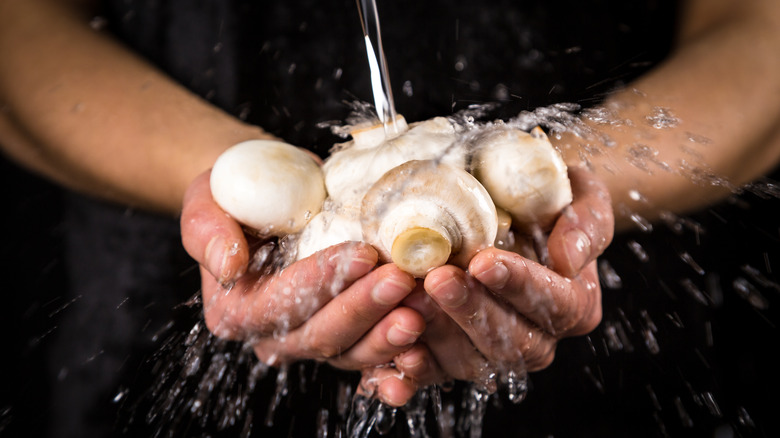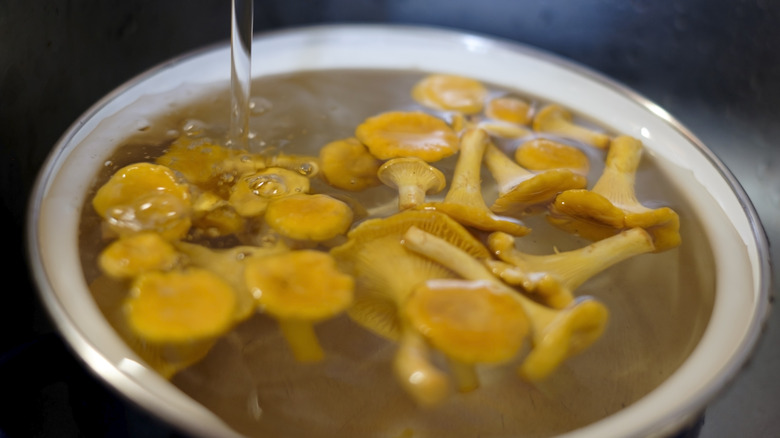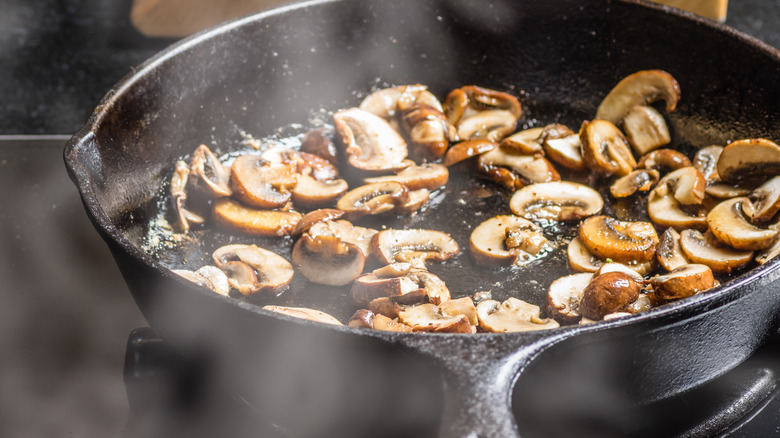The Myth Against Rinsing Mushrooms Is Greatly Exaggerated
For ages, chefs and people in the culinary realm have advised home cooks to never clean any mushrooms in water because the porous fungi will absorb the liquid and become waterlogged. So, instead of giving them a quick rinse, one must brush the clumps of dirt off with a paper towel or a vegetable brush, methods that undoubtedly take a lot longer than spritzing them in the faucet. But, alas, that's what professionals have taught us is the right thing to do. As it turns out, maybe a wash isn't so bad after all.
Despite the hubbub, mushrooms of different varieties really don't absorb that much water if they're given a quick rinse. In addition, water will rinse away more dirt in a quicker time frame than wiping with a paper towel or cloth can, not to mention the water can get into small crevices better than our fingers. So long as you dry them as soon as they've been washed, you won't affect the mushroom's texture too much. Plus, a little extra water in the mushroom may be better for cooking as a moist mushroom won't absorb as much oil in the skillet as a dry one will.
The right way to wash mushrooms
There are a couple of ways you can use water to rinse the dirt off of your mushrooms. The first is to put them in a bowl of water and briefly move them around and rub away any noticeable dirt. The dirt should fall to the bottom of the bowl and away from the mushrooms. Don't let them soak — just submerge them until they are clean, take them out, and pat them dry with a dry cloth or paper towels.
The New York Times' Harry McGee launched his own investigation into how much water mushrooms absorbed (via The Guardian). After a five-minute soak, the testing mushrooms had only absorbed about a sixteenth of a teaspoon of water. So, it can be assumed that a quick dunk will not result in a soggy mushroom. This goes hand in hand with what America's Test Kitchen found: mushrooms don't absorb much liquid. The gilled varieties do, so don't soak them.
Alternatively, place them in a colander and spray the mushrooms off under running water. When the dirt is gone, pat them dry. The key in both methods is not to leave them in the water for a prolonged period of time. But a quick dunk or shower won't make a big difference other than saving time cleaning the 'shrooms. Once they are clean, you can slice, dice, quarter, or otherwise treat them how you normally would before you cook them.
Rinsing mushrooms may be better
From the International Culinary Center, Dave Arnold suggests that washing mushrooms with water will prevent them from absorbing oil if you are sautéing them, which is a good thing (per The Guardian). When they get hot, they will begin to lose their moisture in the pan, and by the time the water has boiled out, they can simply cook and brown in the hot oil, not soak it all up and create a dry pan (and an oily mushroom). It's especially important to use water to clean any type of mushroom that clings to a lot of dirt when harvested — like morels with their porous, ridged caps. It's nearly impossible to get into those tiny crevices with a towel or cloth, and water is really the only thing that will get in there and rinse them out.
Arguably, the only thing worse than a soggy mushroom is a dirty one, and since it's been established that a brief shower isn't going to noticeably affect your mushrooms, feel free to wash away all the dirt anytime you cook with the popular ingredient.



